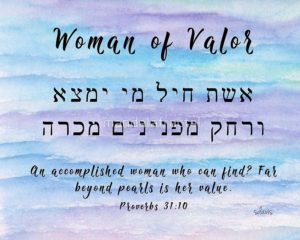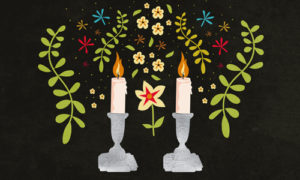Eishet Chayil, “Woman of Valor,†The Ultimate Mother’s Day Poem
This Mother’s Day is unusual—every day is unusual—because the covid pandemic continues to separate many of us from our loved ones. For many families, their mothers and children are apart, and social distance parties and Zoom meetings are the next best thing to actually being together physically. This Mother’s Day, I will be celebrating with my husband and our son Jack, who promised to whip up something creative for dinner, maybe a ginger cocktail, deviled egg appetizer, squash salad, and some kind of chicken drizzled with a tzatziki sauce that is all plated like a fine Mediterranean restaurant. I will be missing our younger daughter Sari who is away at pharmacy school studying for finals.
On this Mother’s Day, I am beyond grateful that I am healthy and so is my family, so truly this is the greatest gift of all.  All I ask for, besides a little adulation for holding down the fort during these last two months of quarantine, is a lilac bush planted in the backyard so I can inhale the sweet fragrance with every gentle breeze.
On every Friday night, when we welcome the Sabbath Queen, we have an opportunity to celebrate Mom every singe week–it’s called Eishet Chayil (pronounced aish-et chai-eel or eishes chayil), translated to “Woman of Valor,” and this poem written thousands of years ago by King Solomon pays homage to the matriach of the family like no other words can.
Traditionally, the husband speaks or sings the song Eishet Chayil before we say kiddish over the wine. It is a way for him to honor his wife, the mother of his children, for the innate qualities that make her the beautiful soul she is. Â By the way, women can sing their own praises if there is no husband or man at home.
Eiset Chayil is from the Book of Proverbs and one of my teachers explained that King Solomon dedicated it to his own mother who he adored.
The Eishet Chayil, the Woman of Valor, sets the tone of love, spirituality, and personal growth for all those around her. To know her is to appreciate her strength and talents. The Eishet Chayil is there as a weekly reminder to never take mom for granted.
Here are the lyrics, line by line, in English:
10 A woman of valor, who can find? Her worth is far beyond that of rubies.
11 Her husband’s heart trusts in her, and lacks no treasures.
12 She is good to him, never bad, all the days of her life.
13 She looks for wool and flax, and sets her hand to them willingly.
14 She is like a merchant fleet, she brings her bread from afar.
15 She rises while it is still night, and supplies provisions for her household, the daily fare of her maids.
16 She sets her mind on a field and acquires it; she plants a vineyard through the fruit of her handiwork.
17 Her loins are girded with strength, and her arms are mighty.
18 She sees that her business thrives; her lamp never goes out at night.
19 She sets her hand to the distaff; and her fingers work the spindle.
20 She stretches out her palms to the poor; she extends her hand to the needy.
21 She does not fear for her household on account of snow, for her whole house is dressed in crimson.
22 She makes covers for herself; her clothing is linen and purple.
23 Her husband is known in the gates, where he sits among the elders of the land.
24 She makes cloth and sells it, and offers a girdle to the Canaanite.
25 She is clothed with strength and splendor; and laughs until the last day.
26 She opens her mouth with wisdom, and the teaching of kindness is upon her tongue.
27 She oversees the activities of her household, and never eats bread of idleness.
28 Her children stand and rejoice in her, her husband praises her.
29 Many women have displayed valor, but you rise above them all.
30 Grace is falsehood and beauty is vapid; a woman who fears God is the one who shall be praised.
31 Give her from the fruit of her hands, and let her works praise her in the gates.
And in Hebrew:
Eishes chayil mi yimtza ve-rachok mi-peninim michrah
Batach bah leiv ba’alah ve-shalal lo yech’sar.
Gemalas’hu tov ve-lo ra kol yemei chayeha.
Dar’eshah tzemer u’fishtim va-ta’as be-cheifetz kapeha.
Hay-esa ko-oniyos socheir mi-merchak tavi lachma.
Va-takam be’od laila va-titein teref le-veisah ve-chok le-na’aroseha.
Zamema sadeh va-tika’cheihu mi-peri chapeha nata karem.
Chag’erah ve-oz mas’neha va-te’ameitz zero’oseha.
Ta’ama ki tov sachra lo yich’beh ba-lailah neira.
Yadeha shilchah va-kishor ve-chapeha tamchu falech.
Kapah par’esa le-ani ve-yadeha shil’echah la-evyon.
Lo sira le-veisa mi-shaleg ki chol beisa lavush shanim.
Marvadim as’esa la sheish ve-argaman levusha.
Noda ba-she’arim ba’ala be-shivto im ziknei aretz.
Sadin as’esa va-timkor va-chagor nas’ena la-kena’ani.
Oz ve-hadar levusha va-tis’chak le-yom acharon.
Piha pas’echah ve-chachma ve-soras chesed al leshona.
Tzofiyah halichos beisa ve-lechem atzlus lo socheil.
Kamu vaneha va-ye’ash’eruha ba’ala va-yehal’elah
Rabos banos asu chayil vi-as alis al kulana.
Sheker ha-chein ve-hevel ha-yofi ishah yiras Adonoy hi sis’halal.
Tenu lah mi-pri yadeha vi-haleluha ba-she’arim ma’aseha.
While my husband has never serenaded me on Shabbat with these beautiful words–he usually can’t wait to tear off a piece of homemade challah dipped in honey–I encourage my son to take the time and speak (or sing) and act this message of love and respect to his better half when he marries one day. To read and understand these verses, line by line, word by word, letter by letter, like any rich Jewish text, requires study and contemplation as our own interpretation evolves over time.
When we think of Woman of Valor, a Jewish Wonder Woman comes to mind, like the Israeli actress Gal Gadot, whose character wearing a gold shied and armor represents beauty and strength. And yes, Eishet Chayil is symbolic of those qualities… and so much more. Eishet Chayil is a woman who strives to be the best she can be, no matter the challenges she faces.
For example, the line “she rises while it is still night†represents that a woman is the light in the home, the one who sheds optimism and hope where there is darkness, the one whose mitzvah is to light the Shabbat candles every Friday night, the person who inspires her family and others around here to be their best. It is the Eishet Chayil who calms the fears during uncertain times that we are living in, and this is never more real than during coronavirus 1w. A Woman of Valor is the candle that glows in the nighttime, bringing understanding, meaning, and patience where there is confusion, even when deep inside she is afraid herself. Like our matriarch Miriam who led the Jewish people out of Egypt with their musical instruments and tambourines, a Woman of Valor believes in her heart that a time will come when we will celebrate and be free again and that we must forge ahead.
During the coronavirus outbreak when our familiar routine has come to a halt, when we are locked inside our homes, and schools, work, and places of worship are closed except remotely, this is when a Woman of Valor jumps into action.  Without even realizing it, a Eishet Chayil  has the innate power to get stuff done. She does her best ot teach from home, prepare nourishing meals, keep everyone safe, healthy, and as happy as possible, all while taking care of her own needs, which are monumental tasks full of obstacles. Eishet Chayil is a woman who inspires people around her, with a positive outlook, eager to accept a challenge, motivates herself and others, shares her light and optimism when the world around us can seem depressing at times. The Eishet Chayil does her best to listen more, and talk less, and tries not to solve her childrens’ every problem. She undertands the virtue of their growing pains and knows the delicate balance of when to let go and when to pull them back in. She is patient and genuine.
A Woman of Valor, a Jewish Super Woman, knows how important it is to take care of her own needs so that she can help others. Â What recharges you–A long walk by yourself outside, eating See’s chocoalte that you keep in a secret hiding place, taking an online Torah class, enjoying a virtual happy hour with friends, soaking in an aromatherapy bath, escaping in a good book, watching your favorite show on Netflix, taking an hour nap…
And the line, “She does not fear for her household on account of snow, for her whole house is dressed in crimson†is symbolic because snow is rare in Jerusalem, which is where King Solomon lived and wrote this poem.  Snow represents the rare, unexpected happenings that nature throws our way, and a Woman of Valor is prepared for anything. She finds the resources, musters the strength, courage, and flexibility to embrace the inevitable twists and turns in life.
So on this Mother’s Day, I hope that you will recognize the Eishet Chayil inside of you and celebrate yourself for the wonderful woman that you are.
Happy Mother’s Day. Shabbat Shalom!
Listen to a traditional and modern Eishet Chayil here and here:


